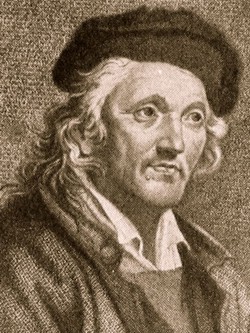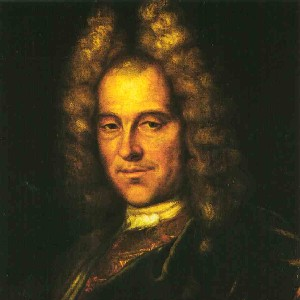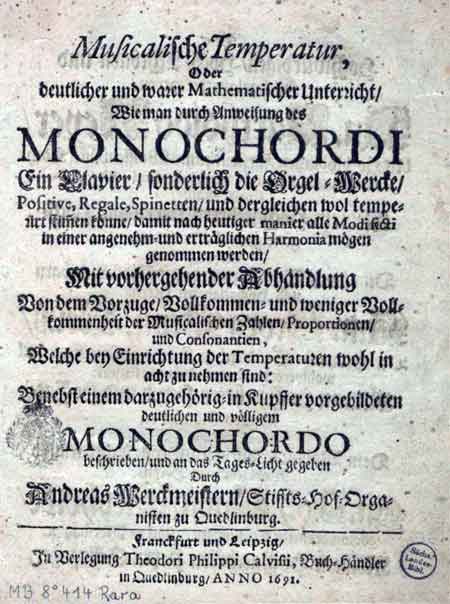Andreas Werckmeister
Andreas Werckmeister ( born November 30, 1645 Benneckenstein, † October 26, 1706 in Halberstadt ) was a German musician and music theorists of the Baroque era.
Life and work
Werckmeister attended school at Nordhausen and Quedlinburg. He received his musical training from his uncles Heinrich Christian Werckmeister and Henry Victor Werckmeister. In 1664 he became organist in Hasselfelde, ten years later in Elbingerode; In 1696 he became organist of the Martini church in Halberstadt.
Of his compositions, a book is merely receive: Violin pieces with basso under the title Musical Private Lust ( 1689).
Werckmeister 's posterity became better known as a music theorist, especially with his writings Musicae mathematicae hodegus curiosus ... ( 1687 ) and Musical temperature, or ... (1691 ) in which he has the follow named him well tempered tunings (see Werckmeister ) described.
The film The Werckmeister Harmonies refers to his music theory.
Werckmeister's idea of the basic skills of a Clavierspielers
The former concept of " Clavier " was more comprehensive than the present, because it was so that each instrument with a keyboard meant, especially organ and harpsichord. Dominated by the virtuosos of the piano faculty was that he knew " how the claves sound together ." Therefore, the good piano player draw from the fact that he " holds nature of the piano " the. Even today the common separation between the composer and the performer was the musical thinking at the time Werckmeister's strange. The player of the Clavier estimated by him ability to control " Clavier and Composition" was identical with the technical ability of improvisation ( ex- tempore game ). Even when transposed to tell " whether an organist has a piano in his head ." Who plays notes ( " tablature " ) by other composers, is suspected sets out to be an impostor. The listeners are thus " up out behind the light " since the alleged connoisseurs of " Clavier and Composition" only the musical thoughts of others - as a kind of plagiarism - imitates why it is necessary that you look " provide a little / not any. bouncer so soon would like to believe: ". those who can not improvise, abide forever" because many form one / they already know everything hung on the tablature / Stümpert something out / and not kömmt further " Werckmeister had in his treatise ' Cribrum musicum '. (p. 42-60 ), the Chapter 52 from the Musical Quack - Salber by Johann Kuhnau ( 1660-1722 ) cited to reaffirm his conception of the true virtuoso. Kuhnau defined the "true virtuoso " as an artist who is able to play an " ex tempore componierte fully coherent Sinfonia or Sounata ". A musical Quack - Salber, however, is a musician who has no improvisation skills.
Music theory based on the Pythagorean- Platonic Philosophy and Natural Theology
Werckmeister is next to Lorenz Christoph Mizler one of the last representatives of a reaching to the ancient connection of philosophy, music theory and theology. The idea of a musical based on theology, which complements the revelation in Scripture in the context of natural theology, and in particular for the " wicked " would make sense, Andreas Werckmeister had expressed in the late font Musicalische Paradoxal - Discourse. In the preliminary report to the posthumously published in 1707 by his heirs work he has his reader to the " musicam in numeri theologizenticam, or musicam Theologicam ". Finally, he reveals the next revelation in the Holy Scriptures in the light of nature. Werckmeister had formulated in the cited document his thoughts in the chapter " From the secret numbers interpretation ": "These figures 1st 2nd 3rd 4th 5th 6th and 8th are now a corpus of complete harmony [ ... ]. You can shadow way reflect the essence of the Almighty Elohim / how he / before the world - reason was yet laid / have been from eternity in His eternal nature. "God's knowledge is so shadowy as ever the beginning of creation through insight into the in the music revealing been possible harmony.










